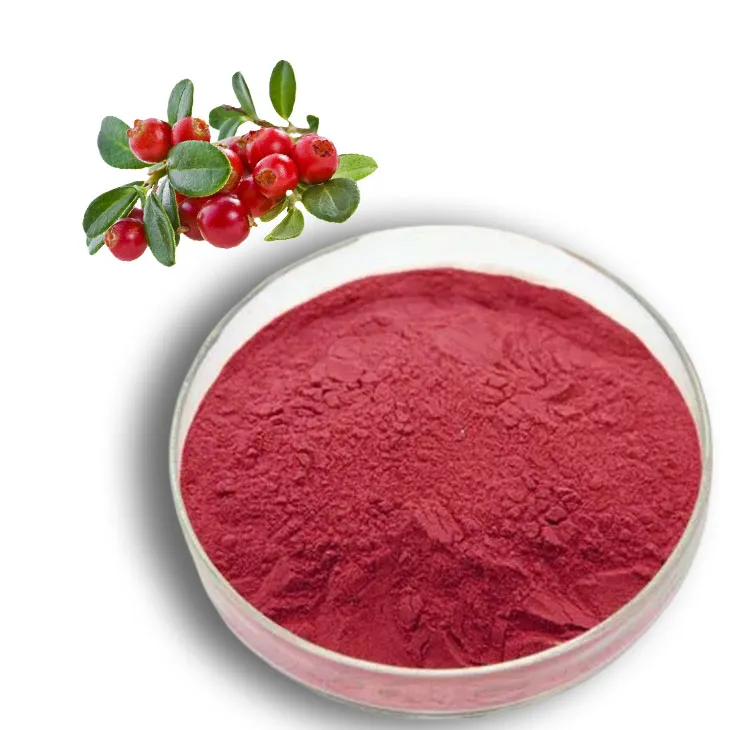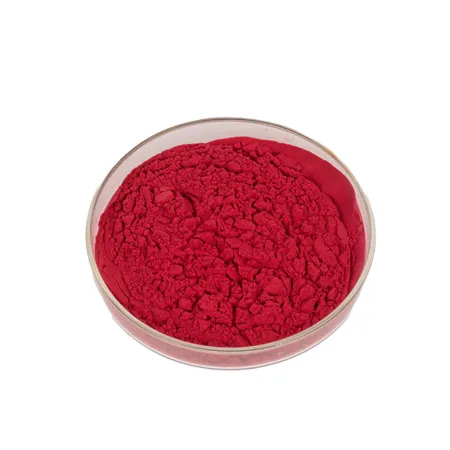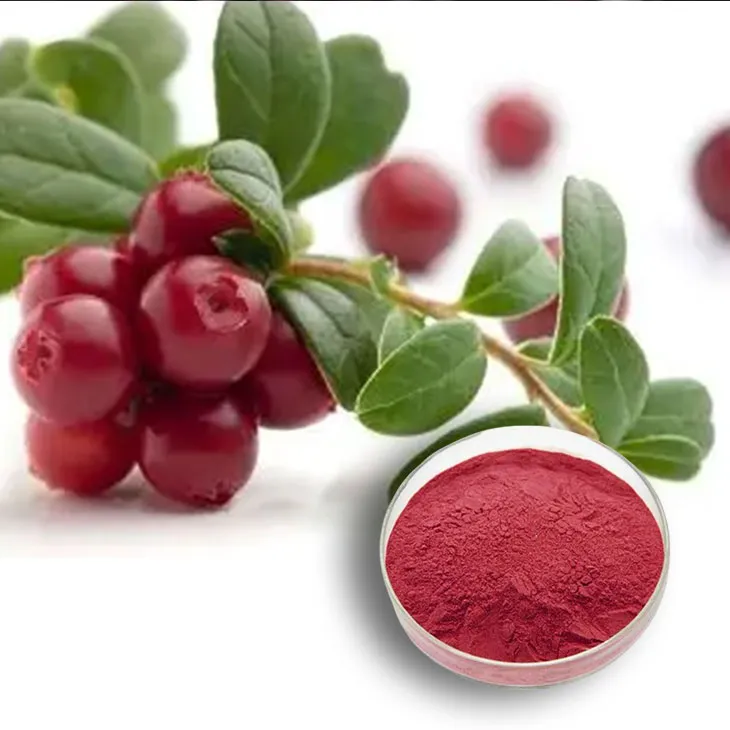- 0086-571-85302990
- sales@greenskybio.com
Best Answers to 7 Key Questions about Cranberry Extract.
2024-12-15

1. What is Cranberry Extract?
Cranberry Extract is a concentrated form of the beneficial compounds found in cranberries. Cranberries are small, red, tart berries that are native to North America. The extract is typically made by processing cranberries to isolate and concentrate key components such as proanthocyanidins (PACs), flavonoids, and organic acids.
These compounds are what give Cranberry Extract its potential health - promoting properties. For example, PACs are thought to play a significant role in preventing certain bacteria from adhering to the urinary tract walls, which is one of the most well - known benefits associated with cranberry products.

2. What are the Main Components of Cranberry Extract?
- Proanthocyanidins (PACs): These are large molecules that belong to the flavonoid family. They are a major component of cranberry extract and are believed to be responsible for many of its health benefits, especially in relation to urinary tract health. PACs work by inhibiting the adhesion of Escherichia coli (E. coli) bacteria to the uroepithelial cells in the urinary tract. This helps prevent urinary tract infections (UTIs) as these bacteria are a common cause of UTIs.
- Flavonoids: Flavonoids in cranberry extract include Quercetin, myricetin, and kaempferol. These compounds have antioxidant properties, which means they can help protect the body's cells from damage caused by free radicals. Free radicals are unstable molecules that can cause oxidative stress, which is linked to various diseases such as cancer, heart disease, and neurodegenerative disorders.
- Organic Acids: Cranberries contain several organic acids, such as citric acid, malic acid, and benzoic acid. These acids contribute to the tart taste of cranberries and also have some antimicrobial properties. They can help create an environment in the body that is less favorable for the growth of harmful bacteria.

3. How is Cranberry Extract Made?
The process of making cranberry extract typically involves several steps:
- Harvesting: Cranberries are harvested when they are ripe. This usually occurs in the fall. The berries are carefully picked to ensure only high - quality fruits are used for extraction.
- Washing: After harvesting, the cranberries are thoroughly washed to remove any dirt, debris, or pesticides that may be on the surface.
- Juice Extraction: The washed cranberries are then processed to extract the juice. This can be done using mechanical presses or other extraction methods. The resulting juice contains many of the beneficial compounds found in cranberries.
- Concentration: The cranberry juice is then concentrated. This is often done through evaporation or other techniques to remove water and increase the concentration of the active compounds. The result is a more potent cranberry extract.
- Filtration and Purification: The concentrated extract may go through filtration and purification processes to remove any impurities or unwanted substances, leaving behind a pure cranberry extract.

4. What are the Health Benefits of Cranberry Extract?
- Urinary Tract Health: As mentioned earlier, cranberry extract is well - known for its role in maintaining urinary tract health. By preventing E. coli bacteria from adhering to the urinary tract walls, it can reduce the risk of UTIs. This is especially beneficial for women, who are more prone to UTIs than men. Studies have shown that regular consumption of cranberry extract can help reduce the recurrence of UTIs in those with a history of such infections.
- Antioxidant Effects: The flavonoids and other antioxidant compounds in cranberry extract help combat oxidative stress in the body. By neutralizing free radicals, they can protect cells from damage and potentially reduce the risk of chronic diseases such as heart disease, cancer, and diabetes. For example, the antioxidant activity may help prevent the oxidation of LDL cholesterol, which is a key step in the development of heart disease.
- Oral Health: Cranberry extract may also have benefits for oral health. It has been shown to inhibit the growth of certain oral bacteria, such as Streptococcus mutans, which is a major contributor to tooth decay and cavities. Additionally, it may help reduce inflammation in the gums, contributing to better gum health.
- Digestive Health: The organic acids in cranberry extract can help maintain a healthy balance of bacteria in the digestive tract. This can improve digestion and absorption of nutrients. Some studies suggest that cranberry extract may also have a role in preventing or treating certain digestive disorders, such as Helicobacter pylori - related stomach ulcers, although more research is needed in this area.

5. How Much Cranberry Extract Should be Consumed?
The appropriate amount of cranberry extract to consume depends on several factors, including the form of the extract (e.g., capsules, juice), the individual's age, sex, and overall health status.
For urinary tract health, a common recommendation is to consume the equivalent of 36 - 72 mg of PACs per day. This can typically be achieved by drinking about 240 - 480 ml of cranberry juice or taking one to two cranberry extract capsules, depending on the concentration of PACs in the product.
However, it's important to note that high - dose consumption of cranberry extract may have some side effects, such as stomach upset or diarrhea. Therefore, it's always best to start with a lower dose and gradually increase it if needed, while also consulting a healthcare provider, especially for those with pre - existing medical conditions or who are taking medications.
6. Are There Any Side Effects of Cranberry Extract?
- Digestive Issues: In some cases, cranberry extract can cause digestive side effects. These may include stomach upset, nausea, and diarrhea. These symptoms are more likely to occur when consuming large amounts of cranberry extract or when an individual has a sensitive stomach. It's important to follow the recommended dosage to minimize the risk of these side effects.
- Interaction with Medications: Cranberry extract may interact with certain medications. For example, it can increase the risk of bleeding when taken with anticoagulant medications such as warfarin. It may also interact with medications for diabetes, potentially affecting blood sugar levels. Therefore, if you are taking any medications, it's crucial to consult your healthcare provider before starting cranberry extract supplementation.
- Allergic Reactions: Although rare, some people may be allergic to cranberries or components in cranberry extract. Allergic reactions can range from mild symptoms such as skin rashes and itching to more severe reactions like difficulty breathing and anaphylaxis. If you experience any signs of an allergic reaction after consuming cranberry extract, seek medical attention immediately.
7. How Can Cranberry Extract be Incorporated into the Diet?
- Cranberry Juice: One of the simplest ways to consume cranberry extract is through cranberry juice. However, it's important to choose a pure cranberry juice or one with minimal added sugars. Many commercial cranberry juices are diluted and have a high sugar content, which can offset some of the health benefits. You can also dilute pure cranberry juice with water or other unsweetened beverages to make it more palatable.
- Cranberry Extract Capsules: Cranberry extract is available in capsule form. This is a convenient option for those who prefer not to drink cranberry juice or who want a more concentrated dose. Capsules are typically standardized to contain a specific amount of PACs or other active compounds, making it easier to control the dosage.
- Cranberry - Based Supplements: There are also other cranberry - based supplements available, such as powders or tinctures. These can be added to foods or drinks for an extra boost of cranberry extract. For example, a cranberry powder can be added to smoothies or yogurt for a nutritious and flavorful addition.
- Cranberry in Recipes: Cranberries can be used in cooking and baking to incorporate cranberry extract into the diet in a more natural way. You can make cranberry sauce, add dried cranberries to oatmeal or muffins, or use fresh cranberries in salads. These methods not only add a delicious tart flavor but also provide the benefits of cranberry extract.
FAQ:
Question 1: What is cranberry extract made of?
Cranberry extract is typically made from cranberries (Vaccinium macrocarpon). It contains various bioactive compounds such as proanthocyanidins, flavonoids, and phenolic acids. These components are concentrated during the extraction process from the whole cranberries, which may also include other nutrients like vitamins (e.g., vitamin C) and minerals in smaller amounts.
Question 2: How does cranberry extract help in preventing urinary tract infections?
Cranberry extract is thought to prevent urinary tract infections (UTIs) mainly due to its proanthocyanidins. These compounds can prevent Escherichia coli, a common bacteria causing UTIs, from adhering to the walls of the urinary tract. By inhibiting this adhesion, the bacteria are less likely to colonize and cause an infection in the urinary system.
Question 3: Can cranberry extract improve digestive health?
There is some evidence that cranberry extract may contribute to improved digestive health. It may help regulate the gut microbiota because of its antioxidant and anti - inflammatory properties. The phenolic compounds in cranberry extract can also potentially protect the gut lining from damage and support normal digestive function, although more research is needed to fully understand the extent of its benefits.
Question 4: Is cranberry extract safe for everyone?
In general, cranberry extract is safe for most people when consumed in moderation. However, some individuals may experience side effects such as stomach upset or diarrhea. People with a history of kidney stones should be cautious as cranberries contain oxalates, which could potentially contribute to the formation of stones in susceptible individuals. Pregnant and breastfeeding women should also consult their healthcare provider before taking cranberry extract supplements.
Question 5: How should cranberry extract be consumed?
Cranberry extract can be consumed in various forms. It is available as dietary supplements in capsule or tablet form. Cranberry juice concentrate, which contains cranberry extract, can also be consumed. Additionally, some food products may be fortified with cranberry extract. It is important to follow the recommended dosage instructions on the product labels. If consuming cranberry juice, it is advisable to choose ones with no added sugars to avoid excessive calorie intake.
Related literature
- The Role of Cranberry in Urinary Tract Health: A Review"
- "Cranberry Extract and Its Impact on Digestive Wellness: Current Research"
- "Safety and Efficacy of Cranberry Extract in Different Populations"
- ▶ Hesperidin
- ▶ citrus bioflavonoids
- ▶ plant extract
- ▶ lycopene
- ▶ Diosmin
- ▶ Grape seed extract
- ▶ Sea buckthorn Juice Powder
- ▶ Beetroot powder
- ▶ Hops Extract
- ▶ Artichoke Extract
- ▶ Reishi mushroom extract
- ▶ Astaxanthin
- ▶ Green Tea Extract
- ▶ Curcumin Extract
- ▶ Horse Chestnut Extract
- ▶ Other Problems
- ▶ Boswellia Serrata Extract
- ▶ Resveratrol Extract
- ▶ Marigold Extract
- ▶ Grape Leaf Extract
- ▶ blog3
- ▶ blog4
- ▶ blog5
-
Pure 85% Tomentil Extract.
2024-12-15
-
Hops Extract
2024-12-15
-
Mulberry Extract
2024-12-15
-
Yellow Pine Extract
2024-12-15
-
Genistein
2024-12-15
-
Propolis Extract Powder
2024-12-15
-
Beetroot Powder
2024-12-15
-
Nettle leaf extract
2024-12-15
-
Europen Bilberry Extract
2024-12-15
-
Dandelion Root Extract
2024-12-15
-
Grape Seed Extract
2024-12-15





















